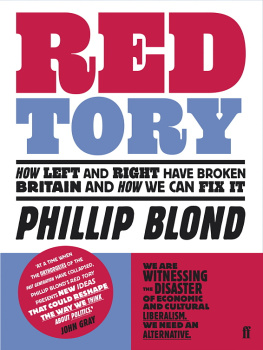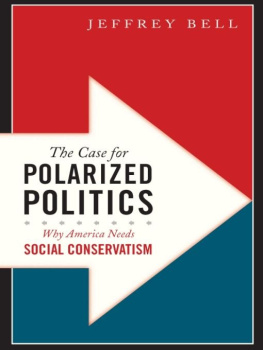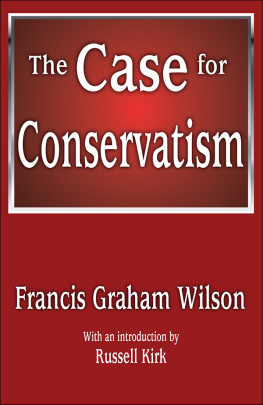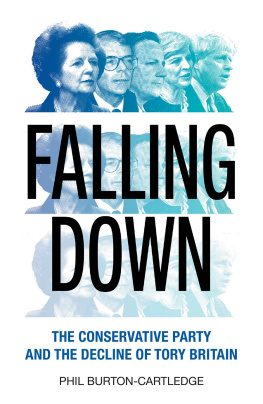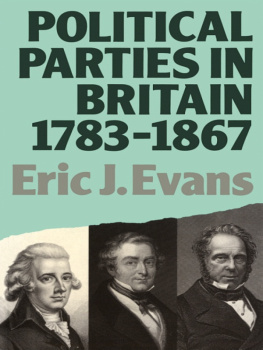I would like to thank several people without whom this book would not have been possible. Firstly the research staff at ResPublica who put together the briefings without which I would not have been able to complete the book. They are Adam Schoenborn, who worked on a number of aspects but particularly on the social crisis and democratic renewal chapters. Samuel Middleton, who, almost single-handed, put together the material for the prosperity chapter, and Sandra Gruescu who worked particularly on the family and its history. Secondly I would like to thank NESTA for their permission to republish a version of the Ownership State paper that we published in September 2009 and I would like to repeat my thanks to all those who helped with that publication, particularly Simon Caulkin and John Seddon. Others who contributed to various aspects of the book were Michael Merrick, Emma Gordan, Dina Reznikova, Caroline McFarland and Kim Mandeng. I would also like to profoundly thank my agent Hannah Westland from RCW, and Kate Murray-Browne and Neil Belton from Faber and Faber, all of whom have persisted and positively encouraged the production and creation of what has now appeared. Finally my most consummate thanks and deepest debt go to John Milbank without whose time, dedication and sheer editorial enthusiasm this book would have not have appeared.
Thank you to you all.
The problem
Something is seriously wrong with Britain. This is an intuition that everybody, whatever their politics, shares. But what is this malaise from which we suffer? We all know the symptoms: increasing fear, lack of trust and abundance of suspicion, long-term increase in violent crime, loneliness, recession, depression, private and public debt, family break-up, divorce, infidelity, bureaucratic and unresponsive public services, dirty hospitals, powerlessness, the rise of racism, excessive paperwork, longer and longer working hours, children who have no parents, concentrated and seemingly irremovable poverty, the permanence of inequality, teenagers with knives, teenagers being knifed, the decline of politeness, aggressive youths, the erosion of our civil liberties and the increase of obsessive surveillance, public authoritarianism, private libertarianism, general pointlessness, political cynicism and a pervading lack of daily joy.
This intuition is not just a private opinion held by a disgruntled few but a public discernment universally shared though seldom addressed. The inability of current politics to tackle these issues successfully requires serious reflection. Certainly all parties engage in ever more ferocious PR about measures to tackle violent youths, ineffective bureaucracies or dysfunctional families and their children. But none of the measures ever really amounts to much, nor do they seem to arrest the social trends that produce such dreadful outcomes. As a result we have a widening gap between the public and contemporary politics and this has a number of dangerous consequences. It is not just that racist and fascist parties like the BNP grow and prosper in the face of widespread white working-class estrangement, nor is it the mere fact of declining participation in political elections. It is more serious and more ubiquitous than both. This gap between the politics of the elites and general mass disaffection reflects, and is caused by, a wholesale collapse of British culture, virtue and belief.
When I say that British culture has collapsed, we again, whatever our political beliefs, almost immediately recognise the truth of it. Our parents will tell us that things truly were better before: that children really were polite, that people really did know their neighbours, and that, yes, whole families really did stay together and form lasting bonds with their relations. In response, university lecturers in cultural studies departments will claim that everybody has always thought that things were better in the past and that we are consumed by false nostalgia and fake memories, and that if history is always conditional and constructed then truth and real achievement are social fictions produced by vested interests. Historically however, we now know that our elders (who for the most part are our betters) are right. Though some things were clearly worse (income levels and general health), many things were better in the past (familial security, human association and the percentage of carbon in the atmosphere). By denying their memories we are denying ourselves the recollection of a better and nobler recent history.
The loss of our culture is evinced in other ways. Perhaps it is best understood as the disappearance of British civil society. By civil society I connote everything that ordinary citizens do that is not reducible to the imposed activities of the central state or the compulsion and determination of the marketplace. So defined, it appears that we are now a flat society. By this I mean that there are only two powers in our country: the state and the marketplace. All other sources of independent autonomous power have been crushed. We no longer have, in any effective independent way, local government, churches, trade unions, cooperative societies, publicly funded educational institutions, civic organisations or locally organised groups that operate on the basis of more than single issues. Whatever these various institutions represent now, what they embodied in the past were means for ordinary people to exercise power. These associations helped to give form and direction to human beings; they allowed parents to craft their families and citizens to shape their communities. Nowadays, however, all such sources of independent power have been eroded; instead, these civil spaces have either vanished or become subject-domains of the centralised state or the monopolised market.
The state and the market have advanced from both left and right on virtually all the self-governing and independent domains that previously constituted civil society in Britain. This uncritical alliance between the state and the market is highly peculiar. In a uniquely Anglo-American fashion, it was decided shortly after Mrs Thatchers election in 1979 that the interests of the state and the market were synonymous. All her supporters agreed that to further the interests of the latter we had to restrict the activities of the former, but in order to extend the interests of the market, Thatcher had to increase the power of the state a logic that was only compounded and increased by New Labour. Both market and state thus accrued power in the name of democracy, and effectively and progressively excluded ordinary citizens from economic and democratic participation. The market has become captured by producer interests along with the state, and, even though both political parties have offered an ideology that pretends that the reverse is true, there can be little doubt that the legacy of both, and of the last thirty years, has been economic and political exclusion for the many, and massive and monopolised enrichment for the few.
Why the governing elites in both Britain and America created this state of affairs and viewed the resulting market state as desirable requires explanation. That is to be found both in history and ideology, which I will come to a little later. Now, though, and perhaps for the first time in almost two generations, the financial meltdown of 2007/8 has given us an opportunity to see the game as it really is. We see that the crisis is due in no small part to the ideological and political complicity between Thatcher and Reagan over capital controls (or the need for abandoning them) and a naive market fundamentalism that allowed the banks to game the state and rig the market. Nor have many demurred (until now) from the continuing fervent advocacy of the market state by Clinton and Blair and Bush and Brown. Only now can we glimpse an alternative one that can perhaps give us a truly free market and a properly participatory state, in which citizens feel valued.

